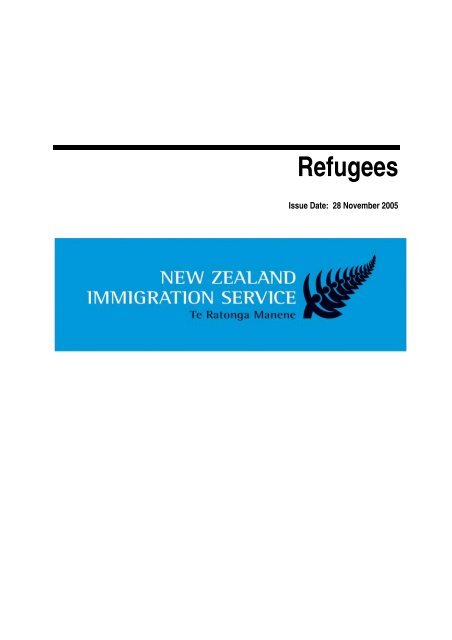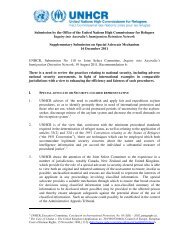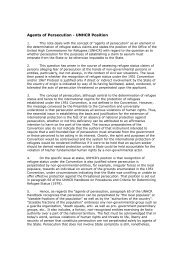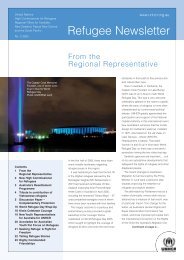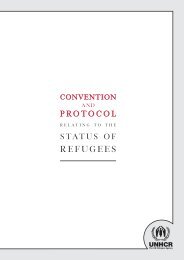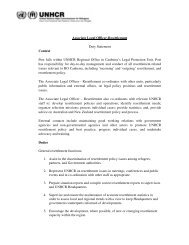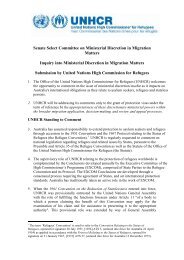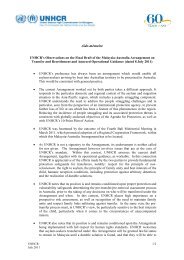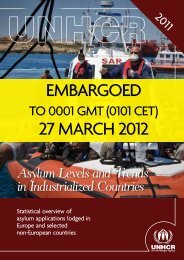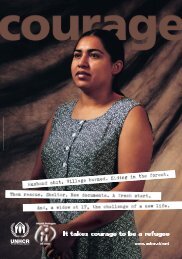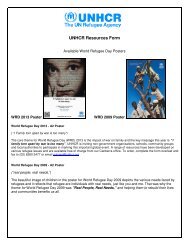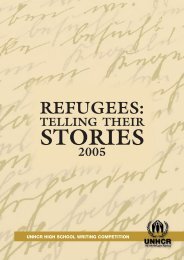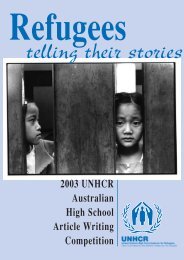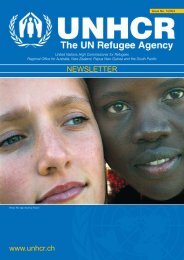Refugees - unhcr
Refugees - unhcr
Refugees - unhcr
Create successful ePaper yourself
Turn your PDF publications into a flip-book with our unique Google optimized e-Paper software.
iContents<strong>Refugees</strong>C1 Objective ............................................................................................................................................. 1-1C2 Refugee status in New Zealand........................................................................................................... 2-1C2.1 Refugee status to be determined under the Immigration Act 1987....................................... 2-1C2.5 New Zealand’s obligations under the 1951 Convention Relating to the Statusof <strong>Refugees</strong>................................................................................................................................... 2-2C2.10 Completed claims may not be challenged........................................................................... 2-4C2.15 Legal aid for refugees or refugee status claimants.............................................................. 2-4C3 Refugee status officers ........................................................................................................................ 3-1C3.1 Refugee status officers.......................................................................................................... 3-1C3.5 Functions of refugee status officers considering claims ....................................................... 3-1C3.10 Additional functions of refugee status officers ................................................................... 3-2C3.15 Powers of refugee status officers ........................................................................................ 3-3C3.20 Immigration matters not within functions of refugee status officers .................................. 3-5C3.25 Refugee status officer may sign certificate as evidence in proceedings ............................. 3-5C4 Claiming refugee status....................................................................................................................... 4-1C4.1 Who may not make a claim for refugee status...................................................................... 4-1C4.5 Who may make a claim for refugee status............................................................................ 4-1C4.10 Whose claim for refugee status may not be considered ...................................................... 4-1C4.15 How refugee claim to be made ........................................................................................... 4-2C4.20 Refugee claim to be confirmed in writing in the prescribed manner .................................. 4-3C4.25 Claims for refugee status on arrival in New Zealand.......................................................... 4-3C4.30 Further requirements........................................................................................................... 4-4C5 Determining claims for refugee status................................................................................................. 5-1C5.1 Confidentiality to be maintained...........................................................................................5-1C5.5 Information on claimant's rights ...........................................................................................5-2
iiContentsC5.10 Officer may determine procedures on claim....................................................................... 5-3C5.15 Request by officer for further information.......................................................................... 5-3C5.20 Comment on prejudicial information.................................................................................. 5-3C5.25 Failure to provide further information or to comment on prejudicial information ............. 5-4C5.30 Request for document to be produced by third party.......................................................... 5-4C5.35 Interviews ........................................................................................................................... 5-5C5.40 Claimant to establish claim................................................................................................. 5-5C5.45 Determining a claim............................................................................................................ 5-6C5.50 Decisions on claims ............................................................................................................ 5-6C5.55 Declining claims or refusing to consider subsequent claims .............................................. 5-7C5.60 Recognition of claimant as refugee..................................................................................... 5-8C5.65 Withdrawal of claim for refugee status............................................................................... 5-8C5.70 Communications on refugee matters................................................................................... 5-9C6 Refugee status claims by detained people........................................................................................... 6-1C6.1 Person claiming refugee status may already be detained...................................................... 6-1C6.5 Detained claimant's right to contact lawyer etc..................................................................... 6-1C6.10 Time limit for detained claimant to confirm claim ............................................................. 6-2C6.15 Interviewing detained claimants ......................................................................................... 6-2C6.20 Subsequent claims by detained people................................................................................ 6-3C6.25 Determining the claim of a detained claimant .................................................................... 6-4C6.30 Decision on claim of detained claimant.............................................................................. 6-4C7 Loss or cancellation of refugee status ................................................................................................. 7-1C7.1 Definition of "loss or cancellation of refugee status"............................................................ 7-1C7.5 Notice of intended determination involving cancellation of refugee status .......................... 7-2C7.10 Procedure for possible cancellation of refugee status ......................................................... 7-3C7.15 Notice of final determination on cancellation of refugee status.......................................... 7-4C8 Special cases ....................................................................................................................................... 8-1C8.1 Claims for refugee status by minors ..................................................................................... 8-1C8.5 Cases involving security concerns ........................................................................................ 8-3
Contents iiiC8.10 Cases involving deportation of persons threatening national security orof suspected terrorists................................................................................................................... 8-3Index
Part 8 <strong>Refugees</strong>P ART 8<strong>Refugees</strong>In This PartC1 Objective .......................................................................................... 1-1C2 Refugee status in New Zealand ........................................................ 2-1C3 Refugee status officers ..................................................................... 3-1C4 Claiming refugee status .................................................................... 4-1C5 Determining claims for refugee status.............................................. 5-1C6 Refugee status claims by detained people ........................................ 6-1C7 Loss or cancellation of refugee status............................................... 7-1C8 Special cases..................................................................................... 8-1This Part replaces the "<strong>Refugees</strong> Part effective 01/03/2000"See also "<strong>Refugees</strong> Part effective 26/07/1999"Note: <strong>Refugees</strong> policy contained in Part 8 of the Operational Manual isImmigration New Zealand operational policy and does not constituteGovernment immigration policy as described in section 13A(1) of theImmigration Act 1987.Effective 28/11/2005
Chapter 1 <strong>Refugees</strong> 1-1C HAPTER 1C1 ObjectiveImmigration Act 1987 s 129AThe objective of New Zealand's refugee policy is to ensure that it meetsits obligations under the 1951 Convention Relating to the Status of<strong>Refugees</strong> and 1967 Protocol Relating to the Status of <strong>Refugees</strong> ("theConvention").Effective 01/10/1999
Chapter 2 <strong>Refugees</strong> 2-1C HAPTER 2C2 Refugee status in New ZealandIn This ChapterC2.1 Refugee status to be determined under the ImmigrationAct 1987................................................................................................ 2-1C2.5 New Zealand’s obligations under the 1951 ConventionRelating to the Status of <strong>Refugees</strong> ........................................................ 2-2C2.10 Completed claims may not be challenged ................................... 2-4C2.15 Legal aid for refugees or refugee status claimants ...................... 2-4C2.1 Refugee status to be determined under the Immigration Act 1987Immigration Act 1987 ss 129A, 129C, 129ZASee C2.1 Effective 01/10/1999a. The object of Part VIA of the Immigration Act 1987 is to provide astatutory basis for the system by which New Zealand ensures that itmeets its obligations under the Convention.b. Whether or not a person should continue to be recognised as arefugee in New Zealand under the Convention must be determined inaccordance with Part VIA of the Immigration Act 1987.c. Anyone who seeks recognition as a refugee in New Zealand underthe Convention must have that claim determined in accordance withPart VIA of the Immigration Act 1987.d. Part VIA of the Immigration Act 1987 applies on and from 1 October1999 to any claim or other matter relating to refugee status that hadbeen made to Immigration New Zealand before that date but whichhad not been finally determined as at that date.e. Where any appeal was part-heard as at 1 October 1999, the rulesrelating to that appeal continue to be those that applied immediatelybefore that date.f. C2.1(d) does not affect the period during which an appeal may bemade in cases where a person had an existing right to appeal adecision on a claim as at 1 October 1999.Effective 28/11/2005
2-2 <strong>Refugees</strong> Chapter 2C2.5 New Zealand’s obligations under the 1951 Convention Relating to the Status of<strong>Refugees</strong>Immigration Act 1987 ss 129D(1), 129X(2)See C2.5 Effective 01/10/1999a. New Zealand acceded to the 1951 Convention Relating to the Statusof <strong>Refugees</strong> on 30 June 1960 and to the 1967 Protocol Relating to theStatus of <strong>Refugees</strong> on 6 August 1973.b. In carrying out their functions under Part VIA of the Immigration Act1987 in determining claims or matters involving the possible loss ofrefugee status, refugee status officers must act in a manner consistentwith New Zealand's obligations under the Convention.c. In carrying out their functions under the Immigration Act 1987 inrelation to a refugee or refugee status claimant, immigration officersmust take into account the provisions of Part VIA of the ImmigrationAct 1987 and of the Convention.C2.5.1 Who is a refugeeImmigration Act 1987 Sixth Schedule Convention Relating to the Status of <strong>Refugees</strong>Article 1A(2)<strong>Refugees</strong> are persons who are outside the country of their nationality orformer habitual residence and have a well-founded fear of beingpersecuted for reasons of race, religion, nationality, membership of aparticular social group or political opinion and are unable or, owing tosuch fear, unwilling to return to that country.Note: for the official definition of a refugee see Article 1A(2) of theConvention.C2.5.5 Country of nationalityImmigration Act 1987 Sixth Schedule Convention Relating to the Status of <strong>Refugees</strong>Article 1A(2)a. In the case of a person who has more than one nationality, "countryof nationality" means each of the countries of which they are anational.b. If a person has the protection of one of their countries of nationality,New Zealand's obligations under the Convention are not activated.C2.5.10 Refugee or refugee status claimant not to be removed ordeportedImmigration Act 1987 ss 114Q, 129X, Sixth Schedule Convention Relating to the Status of<strong>Refugees</strong> Articles 32, 33a. No person who is a refugee status claimant may be removed ordeported from New Zealand until their claim to refugee status hasbeen finally determined.
Chapter 2 <strong>Refugees</strong> 2-3b. No person who has been recognised as a refugee in New Zealand andno refugee status claimant may be removed or deported from NewZealand unless Article 32(1) or 33(2) of the Convention allows theirremoval or deportation.c. Under Article 32(1), Governments undertake not to expel a refugeelawfully on their territory except on grounds of national security orpublic order.d. Article 33(1) of the Convention provides for the obligation of "nonrefoulement",by which Governments undertake not to return arefugee to a country where the refugee's life or freedom would bethreatened for a reason accepted under the Convention.e. Article 33(2) states however that the prohibitions against "nonrefoulement"no longer apply if:ithere are reasonable grounds for regarding a refugee as a dangerto the security of the country in which they are (i.e. in our case,New Zealand); orii a refugee, having been convicted of a particularly serious crime inthe receiving country, poses a danger to the community of thatcountry (i.e. New Zealand).f. Because a determination to apply Article 32(1) or 33(2) of theConvention to a refugee or refugee status claimant involves highlysensitive issues and potential conflict with New Zealand's obligationsunder the Convention, such a determination may only be made:iby an immigration officer with Schedule 1 delegations; andii following:• legal advice; and• if appropriate, following consultation with the Ministry ofForeign Affairs and Trade.g. Articles 32(1) and 33(1) do not apply to people to whom theexclusion provisions in Article 1F have been applied. Such personsare considered unworthy of protection because of their conduct.However such persons should only be removed from New Zealandafter the steps in C2.5.10(f)(i) and (ii) have been followed.Effective 28/11/2005
2-4 <strong>Refugees</strong> Chapter 2C2.10 Completed claims may not be challengedImmigration Act 1987 s 129ZSee C2.10 Effective 01/10/1999No determination on a person's refugee status in New Zealand madebefore 1 October 1999 by an employee of Immigration New Zealand orby the Refugee Status Appeals Authority ("RSAA") may be challengedon the ground that the employee or the Authority had no legal or statutoryauthority to make the determination in question.C2.15 Legal aid for refugees or refugee status claimantsLegal services Act 1991 ss 19(1)(ja) and (jb), 19(3)Effective 28/11/2005a. <strong>Refugees</strong> or refugee status claimants are eligible for civil legal aid onor after 1 October 1999 in relation to:iprocessing any claim for refugee status made on or after 1 April1999; andii processing any other matter arising under C3.10(a) and (b) thatfirst arose on or after 1 April 1999; andiii any judicial review proceedings in relation to matters arisingunder C2.15(a)(i) or (ii); andiv any application for a review by the Inspector-General ofIntelligence and Security of a decision of the Director of Securityto make a security risk certificate under section 114D of theImmigration Act 1987.b. <strong>Refugees</strong> or refugee status claimants are eligible for civil legal aid inrelation to the matters in C2.15(a) whether they are in New Zealandlawfully or unlawfully.c. <strong>Refugees</strong> and refugee status claimants who wish to apply for civillegal aid in relation to the matters in C2.15(a) should be advised tocontact a lawyer.Effective 01/10/1999
Chapter 3 <strong>Refugees</strong> 3-1C HAPTER 3C3 Refugee status officersIn This ChapterC3.1 Refugee status officers .................................................................. 3-1C3.5 Functions of refugee status officers considering claims................ 3-1C3.10 Additional functions of refugee status officers............................ 3-2C3.15 Powers of refugee status officers................................................. 3-3C3.20 Immigration matters not within functions of refugeestatus officers ........................................................................................ 3-5C3.25 Refugee status officer may sign certificate as evidence inproceedings ............................................................................................ 3-5C3.1 Refugee status officersImmigration Act 1987 ss 129B, 129E(2) and (3), 129WSee C3.1 Effective 01/10/1999a. Every refugee claim must be determined by a refugee status officer.Refugee status officers are Immigration New Zealand employeeswhom the Chief Executive has designated to undertake refugee statusdeterminations.b. No person who is currently employed to consider applications forpermits or to administer the removal provisions of the ImmigrationAct 1987 may be designated as, or act as, a refugee status officer.C3.5 Functions of refugee status officers considering claimsImmigration Act 1987 s 129FEffective 28/11/2005a. If a refugee status officer receives a claim that is not a subsequentclaim (see C4.35), it is their function, as appropriate, to determinewhether:ithe claimant is a refugee within the meaning of the Convention;orii the claimant should be excluded from the protection of theConvention because any of the Articles 1D, 1E or 1F of theConvention apply.b. If a refugee status officer receives a subsequent claim, it is theirfunction:
3-2 <strong>Refugees</strong> Chapter 3ito determine whether, since the most recent claim by the claimant,circumstances in the claimant' s home country have changed tosuch an extent that the subsequent claim is based on significantlydifferent grounds from the previous claim; andii only if the officer is satisfied that circumstances have so changed,to determine any matter specified in C3.5(a).C3.10 Additional functions of refugee status officersImmigration Act 1987 ss 129L, 129MImmigration (Refugee Processing) Regulations 1999 regs 11, 12, 13See C3.10 Effective 01/10/1999a. Refugee status officers also have the following functions:iEffective 01/10/1999determining whether the Convention has ceased to apply to aperson who has previously been recognised as a refugee by arefugee status officer (but not by the RSAA) in terms of Article1C of the Convention; andii determining whether the decision to recognise a person as arefugee was properly made in any case where it appears that therecognition given by a refugee status officer (but not by theRSAA) may have been obtained by fraud, forgery, false ormisleading representation or by concealing relevant information,and determining to cease to recognise the person as a refugee ifappropriate; andiii determining whether a person already recognised as a refugeeshould subsequently be excluded from the protection of theConvention in any case where a refugee status officer (but not theRSAA) may not have been able to properly consider matters dealtwith in Article 1D, IE and 1F of the Convention for any reason,including fraud, forgery, false or misleading representation, orconcealment of relevant information; andiv determining whether, in the light of any relevant internationalarrangement or agreement, a person who may have lodged, or hadthe opportunity to lodge, a claim for refugee status in anothercountry may have a claim for refugee status accepted forconsideration in New Zealand; andvdetermining, in the case of a person who had already beenrecognised as a refugee by a country other than New Zealand,whether that person may avail themselves of the protection of thatcountry; andvi applying to the RSAA for a determination as to whether:
Chapter 3 <strong>Refugees</strong> 3-3• the Convention has ceased to apply, in terms of Article 1C, toa person whom the Authority has previously recognised as arefugee; or• the Authority should cease to recognise a person as a refugee,in any case where that recognition may have been obtained byfraud, forgery, false or misleading representation, orconcealment of relevant information; or• any of Articles 1D, 1E and 1F of the Convention should beapplied to exclude a person from the protection of theConvention, in any case where the Authority has recognisedthe person as a refugee but may not have properly consideredthe matters dealt with in those Articles for any reason,including fraud, forgery, false or misleading representation, orconcealment of relevant information.b. Refugee status officers also have the functions specified inC3.10(a)(i) to (iii), as if an appropriate person or body other than arefugee status officer had recognised refugee status, in relation to:ipersons who before 1 January 1991 were recognised as refugeesafter the Interdepartmental Committee on <strong>Refugees</strong> hadconsidered their claim; andii persons recognised as refugees outside New Zealand who havetravelled to New Zealand as mandated refugees.c. When carrying out any function under C3.10(a) or (b), a refugeestatus officer must notify the person concerned personally in theprescribed manner of the matter under consideration.d. In proceedings involving the loss or potential loss of refugee status, arefugee status officer has those powers which they would have as ifthe proceedings were a refugee claim.e. A refugee status officer does not have jurisdiction to makedeterminations on applying Article 32(1) or Article 33(2) (seeC2.5.10(f)). However, if circumstances come to light during thedetermination process which indicate that considerations may ariseunder Article 32(1) or Article 33(2), the officer making thedetermination should bring this fact to the attention of the BranchManager, Refugee Status Branch, who in turn should notify theManager, Border Security & Compliance Operations, BorderSecurity Group, of the fact.C3.15 Powers of refugee status officersImmigration Act 1987 s 129HImmigration (Refugee Processing) Regulations 1999 reg 9 and ScheduleSee C3.15 Effective 01/10/1999Effective 28/11/2005a. In carrying out their functions a refugee status officer may require aclaimant:
3-4 <strong>Refugees</strong> Chapter 3ito supply any information, and within the times, that the officerreasonably requires; andii to produce any documents the claimant possesses or is able toobtain that the officer requires; andiii to consent to any other person releasing any relevant documentsor information relating to the claimant; andiv to provide or allow any fingerprints or photographs of theclaimant to be taken that are reasonably necessary for the purposeof ascertaining or confirming the claimant's identity ornationality; andvto attend an interview.b. If an officer has good cause to suspect that a person other than theclaimant has possession or control of any of the claimant's documents(including any passport or travel document), the officer may requestthe person in the prescribed manner to produce the document (seeC5.30).c. The person who is requested to produce the document may not refuseto comply with the request only because that person has a lien overthe document.d. If a claimant is detained in custody, a refugee status officer mayrequire the relevant member of the Police, Superintendent or otherofficer in charge of the penal institution, or other person havingcustody of the claimant, to:iprovide the officer with access to the place where the claimant isbeing detained, and to the claimant; andii produce the claimant for interview.e. The member of the Police, Superintendent or other officer concernedmust comply with any such requirement, and make appropriatefacilities available for an interview.f. If a claimant who is required to attend an interview fails to attend atthe appointed time and place, the officer may determine the claimwithout conducting the interview.g. Immigration New Zealand may decide the order in which claims areto be handled, and no decision on a claim may be called into questionon the basis that it ought to have been handled earlier or later thanany other claim or category of claim.Effective 28/11/2005
Chapter 3 <strong>Refugees</strong> 3-5C3.20 Immigration matters not within functions of refugee status officersImmigration Act 1987 s 129WThe following are matters for the Minister or appropriate immigration orvisa officer only, and are outside the functions, powers or jurisdiction ofrefugee status officers:a. granting or issuing or giving any visa, permit, exemption or specialdirection; andb. revoking or cancelling any visa, permit, exemption or specialdirection; andc. the conditions to be attached to any visa, permit, exemption or specialdirection; andd. removing or deporting any person from New Zealand; ande. any issue of a humanitarian nature that arises outside the context of adecision relating to the recognition of refugee status in New Zealand.C3.25 Refugee status officer may sign certificate as evidence in proceedingsImmigration Act 1987 s 143(1A) and (5)Effective 01/10/1999a. In any proceedings relating to any matter under Part VIA of theImmigration Act 1987, whether before the RSAA or any court, arefugee status officer may sign a certificate containing any statementin relation to any person to the effect that:ithe person has or has not, at any material time, claimed to be arefugee in New Zealand (or elsewhere); orii the person has or has not, at any material time, been recognisedas a refugee in New Zealand (or elsewhere); oriii the person, while in New Zealand, produced or surrendered to arefugee status officer any passport, certificate of identity, or anyother document that was forged or obtained fraudulently; oriv the person has, or has not, lodged an appeal to the RSAA, or amatter is or is not before a refugee status officer under section129L, or before the RSAA under section 129R, of theImmigration Act 1987.b. A certificate signed by a refugee status officer under section 143(1A)of the Immigration Act 1987 must be treated as proof of the truth ofthe statement in the absence of proof to the contrary established onthe balance of probabilities.c. Every refugee status officer signing such a certificate is, in theabsence of proof to the contrary, presumed to be duly authorised tosign it.Effective 01/10/1999
Chapter 4 <strong>Refugees</strong> 4-1C HAPTER 4C4 Claiming refugee statusIn This ChapterC4.1 Who may not make a claim for refugee status .............................. 4-1C4.5 Who may make a claim for refugee status .................................... 4-1C4.10 Whose claim for refugee status may not be considered .............. 4-1C4.15 How refugee claim to be made.................................................... 4-2C4.20 Refugee claim to be confirmed in writing in the prescribedmanner................................................................................................... 4-3C4.25 Claims for refugee status on arrival in New Zealand .................. 4-3C4.30 Further requirements ................................................................... 4-4C4.1 Who may not make a claim for refugee statusA person who is outside New Zealand may not make a claim for refugeestatus in New Zealand.C4.5 Who may make a claim for refugee statusImmigration Act 1987 ss 114G(4)(b), 114KEffective 01/10/1999a. To be eligible to claim refugee status, a person must be in NewZealand at the time of making a claim.b. People who are in New Zealand either lawfully or unlawfully maymake a claim for refugee status.c. A person about whom the Minister has made a preliminary decisionor final decision to rely on a security risk certificate may make aclaim for refugee status.C4.10 Whose claim for refugee status may not be consideredImmigration Act 1987 ss 129K, 129JEffective 01/10/1999a. A refugee status officer may not consider a claim for refugee statusby a person who is:ithe holder of a residence permit; orii a New Zealand citizen; oriii exempt under section 12 of the Immigration Act 1987 fromhaving to hold a permit.
4-2 <strong>Refugees</strong> Chapter 4b. An officer may determine any question of such a person's continuedrefugee status arising under C3.10(a)(i) to (iii).c. An officer may not consider a claim for refugee status by a personwho has already had a claim for refugee status finally determined inNew Zealand unless the officer is satisfied that, since thatdetermination, circumstances in that person's home country havechanged to such an extent that the subsequent claim is based onsignificantly different grounds from the previous claim.C4.10.1 Subsequent claims for refugee statusImmigration Act 1987 s 129Ja. To be eligible to make a subsequent claim for refugee status, aclaimant must be in New Zealand, whether lawfully or unlawfully.b. A refugee status officer may not consider a claim for refugee statusby a person who has already had a claim for refugee status finallydetermined in New Zealand unless the officer is satisfied that, sincethat determination, circumstances in that person's home country havechanged to such an extent that the subsequent claim is based onsignificantly different grounds from the previous claim.c. In any such subsequent claim, the officer may rely on any finding ofcredibility or fact made in relation to a previous claim, and theclaimant may not challenge any such finding.C4.15 How refugee claim to be madeImmigration Act 1987 ss 129G(1), 148A(3)See C4.15 Effective 01/10/1999Effective 01/10/1999a. A refugee claim is made as soon as a person expresses an intention,either orally or in writing, to a representative of the Department ofLabour or to a member of the Police that they wish to seek refugeestatus in New Zealand.b. People may express an intention to seek refugee status in a variety ofways, including, but not limited to, statements of the following kind:ithey have been persecuted; orii they are in fear of being persecuted; oriii they have been imprisoned for political reasons; oriv they are afraid of being imprisoned in their home country; orvthey want to "see the United Nations" (i.e. the United NationsHigh Commissioner for <strong>Refugees</strong> ("UNHCR") office in NewZealand; orvi they want to know if there is a United Nations (i.e. the UnitedNations High Commissioner for <strong>Refugees</strong>, “UNHCR”) office inNew Zealand; or
Chapter 4 <strong>Refugees</strong> 4-3vii they are "stateless" or "homeless" persons; orviii they are afraid to return to their home country; orix they will be killed if they are returned home; orxthey simply "do not want to return".c. A written claim for refugee status may be:ireceived at any office of the Department of Labour in NewZealand; andii delivered either in person or by mail.d. There is no fee for making a claim for refugee status.C4.20 Refugee claim to be confirmed in writing in the prescribed mannerImmigration Act 1987 s 129G(2)Immigration (Refugee Processing) Regulations 1999 reg 3See C4.20 Effective 01/10/1999Effective 28/11/2005a. Once a claim is made, the claimant must, on request by a refugeestatus officer, confirm the claim in writing in the prescribed manner.b. A claim for refugee status must be:ilodged in writing using the approved form Confirmation of Claimto Refugee Status in New Zealand; andii completed in English; andiii signed by the claimant; andiv accompanied by:• the name of any representative; and• a street address, as well as a facsimile number, if appropriate,at which the claimant may be contacted; and• a current residential address for the claimant.C4.25 Claims for refugee status on arrival in New ZealandEffective 28/11/2005a. Under the guidelines set down by the UNHCR, New Zealand has ageneral obligation to admit people who make a claim for refugeestatus on arrival in New Zealand.b. Officers should give due consideration to such people because theymay be tired, disoriented, distressed, and incapable of communicatingin English, either orally or in writing.c. Immigration officers must not take any action to remove theclaimant.
4-4 <strong>Refugees</strong> Chapter 4d. Unless a preliminary assessment of the claim made by animmigration officer indicates that the claim appears to be "abusive"or "manifestly unfounded", an officer may grant a visitor's permit inaccordance with E8.5.e. A refugee status claim is abusive or manifestly unfounded if:iit is clearly fraudulent or unrelated to the criteria for grantingrefugee status laid down in the Convention; orii the claimant is claiming refugee status in an attempt to evadenormal immigration requirements.f. If a permit is not granted, the claimant must be treated as a person towhom section 128 of the Immigration Act 1987 applies, except thatthey may not be removed from New Zealand until their refugee statushas been finally determined.C4.30 Further requirementsSee C4.30 Effective 01/10/1999Effective 01/10/1999C4.30.1 Evidence of identity to be supplied with application formImmigration (Refugee Processing) Regulations 1999 reg 3(4)a. When lodging the form Confirmation of Claim to Refugee Status inNew Zealand claimants must as far as reasonably possible supplyevidence of their:iidentity (including a recent photograph of the claimant); andii country of origin.b. Evidence of identity may include, but is not limited to, the following:ia travel document (e.g. a passport, certificate of identity orrefugee travel document); orii (if no travel document is available) a birth certificate or otheridentity document; oriii (if neither a travel document nor an identity document isavailable) a statutory declaration outlining the claimant's personaldetails.C4.30.5 Claimant to provide all information relevant to claimImmigration Act 1987 s 129G(3)Immigration (Refugee Processing) Regulations 1999 reg 3(4)a. A claimant must as soon as possible try to provide an officer with allinformation relevant to their claim, including a written statement, atleast five working days prior to the interview.b. The written statement must as far as reasonably possible include:iany evidence supporting the fact or likelihood of persecution; and
Chapter 4 <strong>Refugees</strong> 4-5ii if available, documents indicating the alleged agent of persecutionor potential persecution and the reason for that persecution; andiii details of persons (if any) who can be contacted to support orverify the claim.C4.30.10 Other family members applying for refugee statusImmigration Act 1987 s 129G(3)Immigration (Refugee Processing) Regulations 1999 Reg 3(5)a. A claimant must as soon as possible try to indicate to an officerwhether any other members of their immediate family who are inNew Zealand are also seeking refugee status and, if so, whether anysuch claim is on different grounds.b. If more than one person in a family group is claiming refugee status:ieach claimant must complete a separate Confirmation of Claim toRefugee Status in New Zealand form; butii all those claims should be lodged together.C4.30.15 Claimant to provide current addressImmigration Act 1987 s 129G(4)a. A claimant must provide an officer with:ia current address in New Zealand at which they may becontacted; andii a current residential address.b. A claimant must notify the officer as soon as possible of a change ineither of those addresses.c. The officer may assume that the latest address so provided is correct.Effective 28/11/2005
Chapter 5 <strong>Refugees</strong> 5-1C HAPTER 5C5 Determining claims for refugeestatusIn This ChapterC5.1 Confidentiality to be maintained ................................................... 5-1C5.5 Information on claimant's rights.................................................... 5-2C5.10 Officer may determine procedures on claim ............................... 5-3C5.15 Request by officer for further information .................................. 5-3C5.20 Comment on prejudicial information .......................................... 5-3C5.25 Failure to provide further information or to commenton prejudicial information..................................................................... 5-4C5.30 Request for document to be produced by third party .................. 5-4C5.35 Interviews .................................................................................... 5-5C5.40 Claimant to establish claim.......................................................... 5-5C5.45 Determining a claim .................................................................... 5-6C5.50 Decisions on claims..................................................................... 5-6C5.55 Declining claims or refusing to consider subsequent claims....... 5-7C5.60 Recognition of claimant as refugee ............................................. 5-8C5.65 Withdrawal of claim for refugee status ....................................... 5-8C5.70 Communications on refugee matters ........................................... 5-9C5.1 Confidentiality to be maintainedImmigration Act 1987 s 129Ta. Refugee status officers, other persons who administer theImmigration Act 1987, and persons to whom details are disclosedunder C5.1(c)(i) or (ii) must keep confidential the identity of arefugee status claimant or other person whose status is beingconsidered, as well as the details of their case, at all times, bothduring and after the determination of the claim or other matter.b. Compliance with C5.1(a) may require confidentiality about the veryfact or existence of a claim or case, if disclosing its fact or existencecould identify the person concerned or endanger anyone.c. C5.1(a) does not apply to prevent the disclosure of details:ito a person necessarily involved in determining the relevant claimor matters; orii to an officer or employee of a New Zealand Governmentdepartment or other Crown agency whose functions in relation tothe claimant or other person require knowledge of those details;oriii to the UNHCR; or
5-2 <strong>Refugees</strong> Chapter 5iv in dealings with other countries for the purpose of determining thematters in C3.10(a)(iv) and (v); orvif the details are published in a way that is unlikely to identify theperson concerned; orvi if there is no serious possibility that the safety of the claimant orany other person would be endangered by the disclosure in theparticular circumstances of the case.d. C5.1(a) does not apply to prevent the disclosure of details about aparticular claimant or other person if the claimant or person has,whether expressly or impliedly, by their words or actions waivedtheir right to confidentiality.e. Anyone who without reasonable excuse breaches C5.1(a) orpublishes information released in breach of C5.1(a) commits anoffence and, if convicted, is liable to a fine.C5.5 Information on claimant's rightsImmigration (Refugee Processing) Regulations 1999 reg 4See C5.5 Effective 01/10/1999Effective 01/10/1999Once a refugee status claim has been assigned to a refugee status officerfor processing, that officer must inform the claimant of the followingrights:a. the right to contact a representative of the UNHCR, together withinformation on how to exercise that right; andb. the right to contact a lawyer; andc. the right to have an independent interpreter engaged by ImmigrationNew Zealand present at any interview of the claimant by a refugeestatus officer.C5.5.1 Other information to be provided to claimantsImmigration (Refugee Processing) Regulations 1999 reg 5Refugee status officers must inform claimants of the procedure fordetermining their claim, including the following matters:a. how contact will be maintained; andb. possible requests for further information;c. the claimant's right to provide further information up to the time thatthe claim is actually determined; andd. the availability of an independent interpreter, if appropriate; ande. the decision-making process, including information about the processfor scheduling an interview; andf. the right of appeal to the RSAA if the claim is unsuccessful; and
Chapter 5 <strong>Refugees</strong> 5-3g. the right to an interview before the RSAA if the claimant has notbeen interviewed by a refugee status officer for the purpose ofdetermining the claim.C5.10 Officer may determine procedures on claimImmigration Act 1987 ss 129G(7), 129H(6)See C5.10 Effective 01/10/1999Effective 28/11/2005a. Subject to Part VIA of the Immigration Act 1987 and to anyregulations made under it, and to the requirements of fairness,officers may determine their own procedures on a claim.b. Immigration New Zealand may decide the order in which claims areto be handled, and no decision on a claim may be called into questionon the basis that it ought to have been handled earlier or later thanany other claim or category of claim.C5.15 Request by officer for further informationImmigration (Refugee Processing) Regulations 1999 reg 6Effective 28/11/2005a. An officer may make a written request for further information from aclaimant by:igiving that request at an interview; orii sending it to the claimant.b. Any such request must specify the date (which must be reasonable inall the circumstances) by which the claimant should provide the extrainformation, although the officer may grant further time at theirdiscretion.c. Any such request must include a statement to the effect that if theofficer does not receive the requested further information within thegiven time period, the officer may proceed to determine the claim onthe basis of the information available.C5.20 Comment on prejudicial informationImmigration (Refugee Processing) Regulations 1999 reg 7Effective 01/10/1999a. A refugee status officer must disclose to a claimant any material orinformation obtained by the officer that is or may be prejudicial to theclaimant or the claim if:ithe material or information:
5-4 <strong>Refugees</strong> Chapter 5• was not obtained from the claimant; and• is not publicly available material or information; andii the claimant has not previously had an opportunity to commenton the material or information; andiii the officer intends to take the material or information into accountin determining the claim.b. If an officer discloses potentially prejudicial material or informationto a claimant under regulation 7, they must give the claimant areasonable opportunity to comment on or rebut that material orinformation, whether:iwithin a specified time period; orii at an interview.c. The officer must also advise the claimant that if they fail to respondwithin the given time period or (where reasonable) at the interview,the officer may proceed to determine the claim on the basis of thematerial and information available.d. Nothing in C5.20(a) requires an officer to disclose to a claimant anymaterial or information whose disclosure would be likely to endangerany person, but the officer must advise the claimant of the nondisclosure.Effective 01/10/1999C5.25 Failure to provide further information or to comment on prejudicial informationImmigration (Refugee Processing) Regulations 1999 reg 8If a refugee status officer asks a claimant to provide further informationor invites a claimant to comment on potentially prejudicial material orinformation, and the claimant fails to respond within any appropriate timeframe set for that purpose, the officer may proceed to determine theclaim.C5.30 Request for document to be produced by third partyImmigration Act 1987 s 129H(1)(d)Immigration (Refugee Processing) Regulations 1999 reg 9 and ScheduleEffective 01/10/1999a. A refugee status officer who asks a person other than the claimant(including a person who is a representative of a body corporate) toproduce a document must make the request in the form set out in theSchedule to the Immigration (Refugee Processing) Regulations 1999and must sign the request.b. The request must be served personally on the person concerned or ona representative of the body corporate to which the request isaddressed.Effective 01/10/1999
Chapter 5 <strong>Refugees</strong> 5-5C5.35 InterviewsImmigration (Refugee Processing) Regulations 1999 regs 19, 20See C5.35 Effective 01/10/1999a. If a claimant or a person whose refugee status is in question is to beinterviewed by a refugee status officer, they must be notified inadvance of the date, time and place of the interview.b. The notice must advise the claimant or person of:i(if the first language of the claimant or person is not English) thefact that an independent interpreter will be present at theinterview unless:• the claimant or person requests otherwise; and• this request is acceptable to the officer; andii their right to have a representative, including legal counsel, at theinterview.c. The notice must advise the claimant or person that if they do notattend the interview, the officer may still determine the relevantmatter.C5.35.1 Procedure for interviewsa. In conducting an interview a refugee status officer is not bound byany rules of evidence but may make any inquiries they see fit.b. If the claimant has a representative at the interview, therepresentative must be given the opportunity to make any commentsor submissions on the case to the officer. Subject to the discretion ofthe officer, such comments and submissions will normally be made atthe start or finish of the interview.c. A record of the interview must be made either in writing or by taperecording.d. If possible, potentially prejudicial information should be put to theclaimant at the interview.e. A refugee status officer may consider whether or not an interviewreport needs to be completed and sent to the claimant.C5.40 Claimant to establish claimEffective 28/11/2005Immigration Act 1987 s 129G(5)See C5.40 Effective 01/10/1999a. A claimant has the responsibility of establishing their claim.
5-6 <strong>Refugees</strong> Chapter 5b. The claimant must ensure that all information, evidence andsubmissions that they wish to have considered in support of the claimare provided to the refugee status officer before the officerdetermines the claim.C5.40.1 Documents submitted in support of claima. Any documents submitted in support of the claim that are not writtenin English must be accompanied by a full English translation.b. Translations must:inot be made by a claimant's family member or a person with aninterest in the outcome of the claim; andii be certified as a correct translation made by a person familiar withboth languages and competent in translation work; andiii be prepared and certified by a recognised private or officialtranslation service; andiv be on the official letterhead of the translation service; andvbear the stamp or signature of the translator; andvi be accompanied by the original documents or certified copies.c. All written statements, submissions and any other documentsproduced with the assistance of an interpreter must bear the name ofthe interpreter used.C5.45 Determining a claimImmigration Act 1987 s 129G(6)Effective 28/11/2005In determining a claim, a refugee status officer may seek informationfrom any source, but:a. is not obliged to seek any information, evidence or submissions otherthan that provided by the claimant; andb. may determine the claim on the basis of the information, evidenceand submissions provided by the claimant.C5.50 Decisions on claimsImmigration Act 1987 s 129IImmigration (Refugee Processing) Regulations 1999 reg 10Effective 01/10/1999a. The decision of a refugee status officer on a claim is final, unless theclaimant appeals to the RSAA and the RSAA allows their appeal.b. An officer must notify a claimant, in the prescribed manner, of:ithe officer's decision on the claim; andii the reasons for that decision; and
Chapter 5 <strong>Refugees</strong> 5-7iii if the decision is to decline the claim, the claimant's right ofappeal to the RSAA.c. Notification must be made, to the last address or facsimile numbersupplied by the claimant, by:ipersonal service; orii registered post; oriii facsimile copy.d. If in a family group more than one person has claimed refugee status,each family member must be notified separately of the decision ontheir claim and, if their claim is declined, their right of appeal.e. Once the decision has been made and notified to the claimant, theofficer may not re-open the claim for further consideration.C5.55 Declining claims or refusing to consider subsequent claimsImmigration (Refugee Processing) Regulations 1999 regs 10, 14Effective 01/10/1999a. If a refugee status officer declines to recognise a claim for refugeestatus or refuses to consider a subsequent claim for refugee status, theofficer must notify the claimant in writing of:itheir right to appeal the decision by filing with the RSAA awritten notice of appeal, which must contain:• a current address in New Zealand at which they may becontacted; and• a current residential address; andii the time limits within which to appeal; andiii the address where an appeal may be filed; andiv if they have not already been interviewed by a refugee statusofficer for the purpose of determining the claim, their right to aninterview before the RSAA if they appeal.C5.55.1 Appeal to the Refugee Status Appeals AuthorityImmigration Act 1987 ss 129B(2), 129Oa. The claimant may appeal to the RSAA against a decision not torecognise their claim or to consider their subsequent claim, but mustdo so within 10 working days of being notified of the decision.b. If the claimant is detained in custody when they are notified, theymust appeal within 5 working days of being notified.c. A claim may not be treated as finally determined at any time beforethe appropriate appeal period expires.Effective 01/10/1999
5-8 <strong>Refugees</strong> Chapter 5C5.60 Recognition of claimant as refugeeSee C5.60 Effective 01/10/1999a. If a refugee status officer recognises a claimant as a refugee, theofficer informs the claimant or their representative of this by letter.b. The letter also states that if the claimant wishes to apply forresidence, they should apply to the nearest Immigration New Zealandbranch that processes applications for visas and permits (see S3.15for requirements).C5.60.1 Eligibility to apply for residencea. All claimants who are recognised as having refugee status may applyfor residence on the basis of that recognition (see S3.10).b. Such claimants may include dependants in the residence applicationin accordance with residence policy (see S3).C5.60.5 Residence not automatically granted on recognition ofrefugee statusa. The grant of residence does not automatically follow the recognitionof refugee status.Examples:* if section 7(1) of the Immigration Act 1987 applies to the claimant,and the Minister is not prepared to authorise granting a permit undersection 7(3)(a); or* if Article 33(2) applies (see C2.5.10(e)).b. If it is not appropriate to grant residence to a person recognised as arefugee because they do not meet character or security requirements,officers must take into account the principle of "non-refoulement"under Article 33 of the Convention (see C2.5.10), and considergranting a temporary permit.c. It is also necessary to determine whether considerations exist underArticle 32(1) or 33(2). In such cases New Zealand may lawfullyexpel a refugee because they represent a threat to national security orpublic order, or because they represent a danger to the community(see C2.5.10).C5.65 Withdrawal of claim for refugee statusImmigration Act 1987 ss 129K, 129VImmigration (Refugee Processing) Regulations 1999 reg 21Effective 28/11/2005a. Claimants who wish to withdraw their claim for refugee status beforea determination is made may do so at any time by notifying a refugeestatus officer in writing.
Chapter 5 <strong>Refugees</strong> 5-9b. In such cases, the refugee status officer will give the claimant or theirrepresentative written confirmation of the withdrawal.c. A refugee status claim will be treated as withdrawn if, without givingnotice to a refugee status officer and before a determination is madeon the claim, the claimant:ileaves New Zealand; orii is granted a residence permit.d. In such cases, after verifying the claimant's departure or residencepermit the refugee status officer will notify the claimant or theirrepresentative in writing of the withdrawal, except if the claimant hasno representative and has left New Zealand.C5.70 Communications on refugee mattersC5.70.1 Methods of communicationImmigration (Refugee Processing) Regulations 1999 reg 22Effective 01/10/1999Unless otherwise specified, any matter that is to be communicatedbetween a refugee status officer and a claimant or person whose refugeestatus is in question may be communicated by:a. ordinary post; orb. registered post; orc. personal service; ord. facsimile copy.C5.70.5 Receipt of communicationsImmigration (Refugee Processing) Regulations 1999 reg 23a. If a document is sent by ordinary post or registered post to a claimantor other person whose refugee status is in question, the document isto be treated as having been received by the person 5 working daysafter it is sent.b. If any document is sent by facsimile copy, the document is to betreated as having been received as soon as the machine sending thefacsimile prints a report indicating that the machine intended toreceive the facsimile has received the transmission.C5.70.10 Requirements to supply address include requirement togive facsimile number, if availableImmigration (Refugee Processing) Regulations 1999 reg 24a. When notifying an address or addresses to a refugee status officerunder C4.30.15, a person must also notify the officer of any facsimilenumber (including that of a representative), if available, by whichthey may be contacted.
5-10 <strong>Refugees</strong> Chapter 5b. The requirement to inform a refugee status officer of changes ofaddress also includes the obligation to inform the officer of changesof facsimile number, if appropriate.c. In cases where an officer may assume that the latest address suppliedis correct, the officer may also assume that the latest facsimilenumber supplied is correct.Effective 01/10/1999
Chapter 6 <strong>Refugees</strong> 6-1C HAPTER 6C6 Refugee status claims bydetained peopleIn This ChapterC6.1 Person claiming refugee status may already be detained .............. 6-1C6.5 Detained claimant's right to contact lawyer etc............................. 6-1C6.10 Time limit for detained claimant to confirm claim...................... 6-2C6.15 Interviewing detained claimants.................................................. 6-2C6.20 Subsequent claims by detained people ........................................ 6-3C6.25 Determining the claim of a detained claimant............................. 6-4C6.30 Decision on claim of detained claimant ...................................... 6-4C6.1 Person claiming refugee status may already be detainedA person claiming refugee status may already be detained as a result of:a. being placed into custody under section 128 or section 128B of theImmigration Act 1987 on arrival in New Zealand; orb. being in custody to await removal or deportation from New Zealand;orc. being the subject of a security risk certificate issued under Part IVAof the Immigration Act 1987; ord. being otherwise in custody according to law; ore. being imprisoned in a penal institution.C6.5 Detained claimant's right to contact lawyer etc.Immigration Act 1987 s 140(4)Immigration (Refugee Processing) Regulations 1999 reg 4Effective 01/10/1999a. Under regulation 4 of the Immigration (Refugee Processing)Regulations 1999 (see C5.5), the detained claimant has the right (anda refugee status officer must inform them of this right) to contact:ia representative of the UNHCR; and/orii a lawyer.
6-2 <strong>Refugees</strong> Chapter 6b. If the claimant is being detained under the Immigration Act 1987, inaddition to their rights under regulation 4 (see C6.5 (a) above), theyhave the right (and the person responsible for the claimant's custodymust inform them of this right) under section 140(4) of theImmigration Act 1987 (see Y4.25) to contact the following (whomust be able to visit the claimant and communicate with them inprivate):ia lawyer; orii if the claimant is under 17 years of age, a parent, guardian orresponsible adult.C6.10 Time limit for detained claimant to confirm claimSee C6.10 Effective 01/10/1999Effective 01/10/1999a. If a detained person indicates that they wish to claim refugee status,they should, without delay and preferably within two calendar days,confirm their claim in writing in the prescribed manner (see C4.20).b. This period of time may be shorter if the person is making asubsequent claim for refugee status (see C6.20) or if the person is tobe interviewed without a written statement.c. In setting a time limit for the detained person to confirm their claim, arefugee status officer must ensure that the person is given reasonableopportunity to exercise their right under regulation 4 of theImmigration (Refugee Processing) Regulations 1999 and (ifapplicable) section 140(4) of the Immigration Act 1987 (see C6.5) tocontact:ia lawyer; and/orii a representative of the UNHCR; and/oriii a parent, guardian or responsible adult (if applicable).C6.15 Interviewing detained claimantsSee C6.15 Effective 01/10/1999Effective 28/11/2005a. Although a refugee status officer is not obliged to interview aclaimant (except under C7.10, if requested to do so), the officer maychoose to conduct an interview, even if the claim is a subsequentclaim.b. An interview should normally be scheduled 15 working days afterreceiving the completed Confirmation of Claim to Refugee Status inNew Zealand form, but may be scheduled earlier if necessary.
Chapter 6 <strong>Refugees</strong> 6-3c. In scheduling the interview, a refugee status officer must ensure thatthe claimant is given reasonable opportunity to exercise their rightunder regulation 4 of the Immigration (Refugee Processing)Regulations 1999 and (if applicable) section 140(4) of theImmigration Act 1987 (see C6.5) to contact:ia lawyer; and/orii a representative of the UNHCR; and/oriii a parent, guardian or responsible adult (if applicable).d. If appropriate, the officer may tape-record the interview.C6.15.1 Interview reports where claimant is detaineda. If an interview report is to be prepared (see C5.35.5), it should ifpossible be completed within 10 working days of the interview.b. Whether or not the claimant has a representative, the claimant may begiven 10 working days in which to comment on an interview report,and the covering letter should draw attention to the amended timegiven for comment.c. If the claimant has a representative, any interview report should befaxed to them and the time of transmission noted on the file.d. If the claimant has no representative, an immigration officer orrefugee status officer should personally deliver any interview reportto the claimant. If necessary, an interpreter should accompany theofficer in order to translate the report and assist the claimant incommenting on it.C6.20 Subsequent claims by detained peopleEffective 28/11/2005a. If a detained person makes a subsequent claim for refugee status, therefugee status officer conducting the interview should first ascertainwhether, since the final determination of the previous claim,circumstances in the claimant's home country have changed to suchan extent that the subsequent claim is based on significantly differentgrounds from the previous claim.b. If the officer considers that circumstances have not changedsufficiently, they should conclude the interview at that point.c. If the officer considers that circumstances have so changed, theyshould continue the interview to enable the claimant to present theircase in full.Effective 01/10/1999
6-4 <strong>Refugees</strong> Chapter 6C6.25 Determining the claim of a detained claimantSee C6.25 Effective 01/10/1999Because the claimant is being detained, the refugee status officer shoulddetermine the claim as speedily as possible, ideally within 20 weeks fromthe date of lodgement of the Confirmation of Claim to Refugee Status inNew Zealand form. The refugee status officer will make a decision after:a. receiving submissions or comments on the interview report; orb. if there are no submissions or comments on the interview report:ibeing notified that there are no submissions or comments on theinterview report; orii the time limit for making submissions or comments on theinterview report has expired, orc. the interview itself, if there is no interview report.C6.30 Decision on claim of detained claimantSee C6.30 Effective 01/10/1999Effective 28/11/2005a. The provisions of C5.50 (Decisions on claims)and C5.55 (Decliningclaims or refusing to consider subsequent claims) apply to refugeestatus claims made by people who are detained.b. If the decision is to recognise the claimant as a refugee:ithe refugee status officer must notify Compliance Operations, aswell as the claimant or their representative, of this; andii Compliance Operations will then arrange for the claimant to bereleased from custody, if the claimant is being detained:• under section 128 or 128B of the Immigration Act 1987; or• to await removal or deportation from New Zealand (unlesstheir removal or deportation under Article 32(1) or 33(2) ofthe Convention is being considered); or• under Part VIA of the Immigration Act 1987 (unless theirremoval or deportation under Article 32(1) or 33(2) of theConvention is being considered)c. If the decision is to decline the claim, the notification of the decisionto the claimant must contain the following 2 paragraphs, either (ifthere is a representative):i"The Refugee Status Appeals Authority will only consider anappeal lodged within 5 working days of the date your clientreceives this decision.If your client fails to appeal within the appeal period, they may beremoved from New Zealand on the first available flight after theappeal period expires."
Chapter 6 <strong>Refugees</strong> 6-5or (if there is no representative):ii "The Refugee Status Appeals Authority will only consider anappeal lodged within 5 working days of the date you receive thisdecision.If you fail to appeal within the appeal period, you may beremoved from New Zealand on the first available flight after theappeal period expires."d. A detained claimant whose claim has been declined may be removedfrom New Zealand earlier than the end of the appeal period if,understanding the implications of what they are doing, they formallywaive their right of appeal, and ask to be removed forthwith, inwriting.Effective 28/11/2005
Chapter 7 <strong>Refugees</strong> 7-1C HAPTER 7C7 Loss or cancellation of refugeestatusSee C7 Effective 01/10/1999In This ChapterEffective 28/11/2005C7.1 Definition of "loss or cancellation of refugee status".................... 7-1C7.5 Notice of intended determination involving cancellationof refugee status .................................................................................... 7-2C7.10 Procedure for possible cancellation of refugee status.................. 7-3C7.15 Notice of final determination on cancellation of refugee status .. 7-4C7.1 Definition of "loss or cancellation of refugee status"Immigration (Refugee Processing) Regulations 1999 reg 2See C7.1 Effective 01/10/1999"Loss or cancellation of refugee status" means the situation where aperson ceases to be recognised as a refugee by the Government of NewZealand in one of the following circumstances:a. the Convention has ceased to apply to a person who has previouslybeen recognised as a refugee in terms of Article 1C of theConvention;b. recognition of a person as a refugee is cancelled following adetermination that refugee status may have been obtained by fraud,forgery, false or misleading representation, or by concealment ofrelevant information;c. a person already recognised as a refugee is excluded from theprotection of the Convention, in any case where the matters dealtwith in Articles 1D, 1E and 1F of the Convention were not properlyconsidered for any reason, including fraud, forgery, false ormisleading representation, or by concealment of relevant information.Effective 28/11/2005
7-2 <strong>Refugees</strong> Chapter 7C7.5 Notice of intended determination involving cancellation of refugee statusImmigration (Refugee Processing) Regulations 1999 reg 11See C7.5 Effective 01/10/1999a. In any case where a person has been recognised as a refugee by arefugee status officer, and an officer intends to make a determinationunder section 129L(1)(b) or (1)(c) of the Immigration Act 1987 to theeffect that a person's refugee status may be cancelled, the officer mustnotify the person concerned in the approved form of:ithat intention; andii the matter it involves, including:• the reasons for it; and• any evidence relating to it.b. The officer must sign the notice, and the notice must be servedpersonally on the person to whom it relates.c. At the same time as the person is served with the notice they must begiven a copy of all relevant information from their departmental file.Any material or information whose disclosure would be likely toendanger any person may be withheld from the person, but the personmust be notified of that non-disclosure.d. At the same time as the person is served with the notice they mustalso be informed of their right:ito contact a representative of the UNHCR, together withinformation on how to exercise that right; andii to contact a lawyer; andiii within 20 working days, to request an interview and to providewritten submissions on the intended cancellation of refugeestatus; andiv to have an independent interpreter present at any interview by theofficer; andvto appeal to the RSAA if the officer should make a determinationunder section 129L of the Immigration Act 1987 involvingcancellation of refugee status.e. A person who is served with a notice under regulation 11 of theImmigration (Refugee Processing) Regulations 1999 must providethe person serving the notice with an address, including a facsimilenumber if available, at which they may be contacted about the matter.f. In any case where a person has been recognised as a refugee by theRefugee Status Appeals Authority, and a refugee status officerintends to make an application to the Authority, the officer may do sounder s129L(f)(ii) or (iii) of the Immigration Act 1987. Suchapplications are made to the Secretariat of the Authority and must besubmitted with a copy of any information relevant to the recognitionof the person as a refugee and the determination of the application.
Chapter 7 <strong>Refugees</strong> 7-3g. If an application for cancellation of refugee status is accepted forconsideration, the Authority must take reasonable steps to arrange fora copy of the application to be served personally on the person towhom it relates.h. At the same time as the person is served with a copy of theapplication the person must be given a copy of all relevantinformation from their departmental file or other information lodgedwith the Authority. Any material or information disclosure of whichwould be likely to endanger any person may be withheld from thatperson, but that person must be notified of that non-disclosure.i. At the same time as the person is served with a copy of theapplication, they must also be informed of their right:ito contact a representative of the Office of the United NationsHigh Commissioner for <strong>Refugees</strong>, together with information as tohow to exercise that right; andii to contact a lawyer and to request and be granted an interview,and to provide written submissions in relation to thedetermination of the application; andiii to have an independent interpreter present at any interview by theAuthority.j. A person who is served with a copy of the application concerningcancellation of their refugee status must provide to the person servingthe copy an address, including a facsimile number if appropriate, towhich communications regarding the matter may be made.C7.10 Procedure for possible cancellation of refugee statusImmigration (Refugee Processing) Regulations 1999 reg 12See C7.10 Effective 01/10/1999Effective 28/11/2005a. A person who receives notice of the possible cancellation of refugeestatus is entitled:ito make a written submission on the matter of the possiblecancellation of their refugee status, and any reasons why theyshould continue to be recognised as a refugee; andii to be interviewed on the matter of the possible cancellation oftheir refugee status, and any reasons why they should continue tobe recognised as a refugee.b. Within the requirements of fairness, written responses to a noticereceived must be provided within 20 working days, or before anyinterview is held, whichever is first.c. If an interview is requested, the officer will schedule an interview inaccordance with the Immigration (Refugee processing) Regulations1999 regs 19, 20 and C5.35.
7-4 <strong>Refugees</strong> Chapter 7d. Timeframes for final written submissions following any interviewwill be provided by the interviewing officer and will depend onwhether an interview report is completed. Such a timeframe willusually be 20 working days following either the last interview or, ifproduced, the interview report.e. If the refugee status officer determines that refugee status may havebeen recognised due to fraud, forgery, false or misleadingrepresentation, or by concealment of relevant information, then theofficer will consider whether there is any further, new or other reasonwhy that person should continue to be recognised as a refugee.f. Before making any decision involving the cancellation of refugeestatus, the relevant officer must take into account any submissions(including any personal interview), documents or other evidenceproduced by the person affected.g. A decision on the matter specified in the notice may not be madesooner than 20 working days after the date on which the personreceives the notice.C7.15 Notice of final determination on cancellation of refugee statusImmigration (Refugee Processing) Regulations 1999 reg 13See C7.15 Effective 01/10/1999Effective 28/11/2005a. If a refugee status officer has notified a person of their intention tomake a determination involving cancellation of refugee status, theofficer must notify the person in writing of the officer's final decisionon the determination, and the reasons for that decision.b. If the decision was to make a determination that involves cancellationof refugee status, at the same time as notifying the person of thedecision the officer must notify the claimant in writing of:itheir right to appeal the decision by filing with the RSAA awritten notice of appeal, which must contain:• a current address in New Zealand at which they may becontacted; and• a current residential address; andii the time limits within which to appeal; andiii the address where an appeal may be filed; andiv if they have not already been interviewed by a refugee statusofficer for the purpose of determining the issue relating to thecancellation of refugee status, their right to an interview beforethe RSAA if they appeal.
Chapter 7 <strong>Refugees</strong> 7-5c. Notification must be made, to the last address or facsimile numbersupplied by the person, by:iiipersonal service; orregistered post; oriii facsimile copy.Effective 28/11/2005
Chapter 8 <strong>Refugees</strong> 8-1C HAPTER 8C8 Special casesIn This ChapterC8.1 Claims for refugee status by minors.............................................. 8-1C8.5 Cases involving security concerns................................................. 8-3C8.10 Cases involving deportation of persons threatening nationalsecurity or of suspected terrorists.......................................................... 8-3C8.1 Claims for refugee status by minorsImmigration act 1987 s 141BSee C8.1 Effective 01/10/1999A minor* who is seeking recognition as a refugee in New Zealand musthave a responsible adult to represent their interests.C8.1.1 Definition of a 'minor'Immigration Act 1987 s 141BA minor* is a person under 17 years of age who is not married or in acivil union.C8.1.5 Nomination of responsible adultImmigration Act 1987 s 141Ba. If one or more of the minor's* parents are also seeking refugee statusin New Zealand or are appealing against a decision of a refugee statusofficer to the RSAA, that parent:imust represent the minor's* interests; andii is the responsible adult for the minor*.b. If a minor* who is seeking refugee status does not have a responsibleadult to represent their interests, a refugee status officer must takesteps to ensure that a responsible adult is nominated, includingmaking the nomination, if necessary.c. A person may be nominated as a responsible adult only if:ithe person is 20 or more years of age; andii except in the case of a parent or guardian of the minor*, theperson is a New Zealand citizen or the holder of a residencepermit; andiii the person is any of the following:
8-2 <strong>Refugees</strong> Chapter 8• a parent, guardian or relative of the minor*; or• a person suggested by the minor*; or• any other person having responsibility for the minor* or whois otherwise suitable to represent the minor's* interests; or• if no other suitable person is available, a person designated bythe chief executive of the Ministry of Social Development;andiv (except in the case of a parent or guardian of the minor*) theperson agrees in writing to be nominated as a responsible adult.d. Should the need arise, and after reasonable consultation, a substituteresponsible adult may be nominated.e. A responsible adult who is representing the interests of the minor* inany refugee status claim must supply a refugee status officer with anaddress in New Zealand at which they may be notified of any matterconcerning the minor*.C8.1.10 Roles and rights of responsible adultImmigration Act 1987 ss 141B, 141Ca. The role of a responsible adult relates to those matters or proceedingsfor which the nomination was made.b. The role of responsible adult finishes when the minor* leaves NewZealand.c. The responsible adult may appeal to the RSAA on the minor's*behalf.d. To the extent practicable given the level of maturity andunderstanding of the minor*, the responsible adult must try to findout the views of the minor* and make them known on behalf of theminor*, where appropriate.e. Any document that must served on or notified to the minor* mustinstead be served on or notified to the responsible adult, and suchservice or notification is presumed to be service on or notification tothe minor*.C8.1.15 Views of minor to be consideredImmigration Act 1987 s 141Da. In any claim to be recognised as a refugee, as far as practicable, theminor* must be given an opportunity to express their views on thematter, whether personally or through a responsible adult.b. The refugee status officer must give due weight to those views,taking into account the minor's* age and level of maturity andunderstanding.Effective 28/11/2005
Chapter 8 <strong>Refugees</strong> 8-3C8.5 Cases involving security concernsImmigration Act 1987 ss 114G, 114K, 114Qa. If the Minister of Immigration gives notice to the chief executive ofthe Department of Labour that he or she has made a preliminarydecision to rely on a security risk certificate about a refugee statusclaimant:ithe processing of the refugee status claim continues; andii the officer processing the claim must determine the claim; oriii if the claim has not been allocated to an officer for processing, itmust be allocated as soon as possible to an officer, who mustdetermine the claim; andiv the claimant continues to have the right to appeal to the RSAAagainst a decision to decline the refugee claim.b. If the Minister has given notice to the chief executive of theDepartment of Labour that he or she has made a preliminary decisionor, as the case may be, a final decision to rely on a security riskcertificate about a person who is not a refugee status claimant, thatperson still has the right to claim refugee status.c. If such a person claims refugee status:ia refugee status claim must be processed; andii the claim must be allocated as soon as possible to a refugee statusofficer for processing, and the officer must determine the claim;andiii the claimant continues to have the right to appeal to the RSAAagainst a decision to decline the refugee claim.d. No refugee status claimant about whom the Minister has made a finaldecision to rely on a security risk certificate may be removed ordeported from New Zealand until their refugee status has been finallydetermined.e. Considerations under Article 32(1) or 33(2) of the Convention (seeC2.5.10) may arise concerning a refugee about whom the Ministerhas made a final decision to rely on a security risk certificate.Effective 01/10/1999C8.10 Cases involving deportation of persons threatening national security or of suspectedterroristsImmigration Act 1987 ss 72, 73a. If the Governor-General by Order in Council under section 72, or theMinister of Immigration by written order under section 73, orders arefugee status claimant to be deported from New Zealand:ithe refugee status officer processing the claim must determine theclaim; or
8-4 <strong>Refugees</strong> Chapter 8ii if the claim has not been allocated to an officer for processing, itmust be allocated as soon as possible to an officer, who mustdetermine the claim; andiii the claimant continues to have the right to appeal to the RSAAagainst a decision to decline the refugee claim.b. If the Governor-General by Order in Council, or the Minister ofImmigration by written order, orders the deportation from NewZealand of a person who is not a refugee status claimant, that personstill has the right to claim refugee status.c. If such a person claims refugee status:ithe claim must be allocated as soon as possible to a refugee statusofficer for processing, and the officer must determine the claim;andii the claimant continues to have the right to appeal to the RSAAagainst a decision to decline the refugee claim.d. If the Governor-General by Order in Council, or the Minister ofImmigration by written order, orders a refugee status claimant to bedeported from New Zealand, that claimant may not be deported fromNew Zealand until their refugee status has been finally determined.e. Considerations under Article 32(1) or 33(2) of the Convention (seeC2.5.10) may arise concerning a refugee whom the Governor-General by Order in Council, or the Minister of Immigration bywritten order, has ordered to be deported from New Zealand.Effective 01/10/1999
Index 1IndexCC1 Objective • 1-1C2 Refugee status in New Zealand • 2-1C2.1 Refugee status to be determined underthe Immigration Act 1987 • 2-1C2.10 Completed claims may not bechallenged • 2-4C2.15 Legal aid for refugees or refugee statusclaimants • 2-4C2.5 New Zealand’s obligations under the1951 Convention Relating to the Status of<strong>Refugees</strong> • 2-2C3 Refugee status officers • 3-1C3.1 Refugee status officers • 3-1C3.10 Additional functions of refugee statusofficers • 3-2C3.15 Powers of refugee status officers • 3-3C3.20 Immigration matters not withinfunctions of refugee status officers • 3-5C3.25 Refugee status officer may signcertificate as evidence in proceedings • 3-5C3.5 Functions of refugee status officersconsidering claims • 3-1C4 Claiming refugee status • 4-1C4.1 Who may not make a claim for refugeestatus • 4-1C4.10 Whose claim for refugee status may notbe considered • 4-1C4.15 How refugee claim to be made • 4-2C4.20 Refugee claim to be confirmed inwriting in the prescribed manner • 4-3C4.25 Claims for refugee status on arrival inNew Zealand • 4-3C4.30 Further requirements • 4-4C4.5 Who may make a claim for refugee status• 4-1C5 Determining claims for refugee status • 5-1C5.1 Confidentiality to be maintained • 5-1C5.10 Officer may determine procedures onclaim • 5-4C5.15 Request by officer for furtherinformation • 5-4C5.20 Comment on prejudicial information •5-4C5.25 Failure to provide further information orto comment on prejudicial information • 5-5C5.30 Request for document to be produced bythird party • 3-4, 5-5C5.35 Interviews • 5-6, 7-3C5.40 Claimant to establish claim • 5-6C5.45 Determining a claim • 5-7C5.5 Information on claimant's rights • 5-2, 5-3C5.5 Information on claimant's rights(01/10/1999) • 5-2, 5-3C5.50 Decisions on claims • 5-7, 6-4C5.55 Declining claims or refusing to considersubsequent claims • 5-8, 6-4C5.60 Recognition of claimant as refugee • 5-9C5.65 Withdrawal of claim for refugee status •5-9C5.70 Communications on refugee matters • 5-10C6 Refugee status claims by detained people •6-1C6.1 Person claiming refugee status mayalready be detained • 6-1C6.10 Time limit for detained claimant toconfirm claim • 6-2C6.15 Interviewing detained claimants • 6-2C6.20 Subsequent claims by detained people •6-3C6.25 Determining the claim of a detainedclaimant • 6-4C6.30 Decision on claim of detained claimant •6-4C6.5 Detained claimant's right to contactlawyer etc. • 6-1C7 Loss or cancellation of refugee status • 7-1C7.1 Definition of • 7-1C7.10 Procedure for possible cancellation ofrefugee status • 7-3C7.15 Notice of final determination oncancellation of refugee status • 7-4C7.5 Notice of intended determinationinvolving cancellation of refugee status • 7-2C8 Special cases • 8-1C8.1 Claims for refugee status by minors • 8-1C8.10 Cases involving deportation of personsthreatening national security or of suspectedterrorists • 8-3C8.5 Cases involving security concerns • 8-3Claiming refugee status • 4-1
2 IndexFFunctions of refugee status officersconsidering claims • 3-1IImmigration matters not within functions ofrefugee status officers • 3-5LLegal aid for refugees or refugee statusclaimants • 2-4RRefugee status in NZ • 2-1Refugee status officer may sign certificate... •3-5Refugee status officers • 3-1<strong>Refugees</strong> • 0-1


